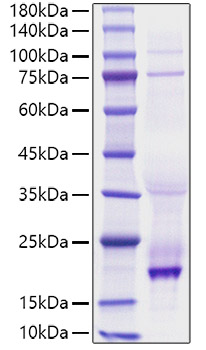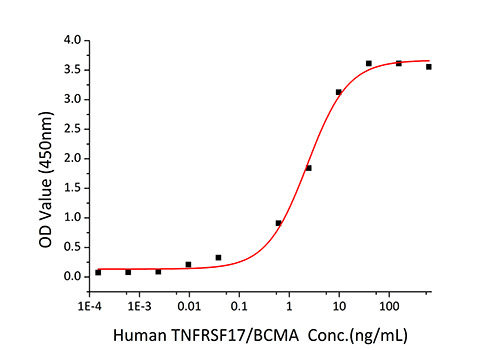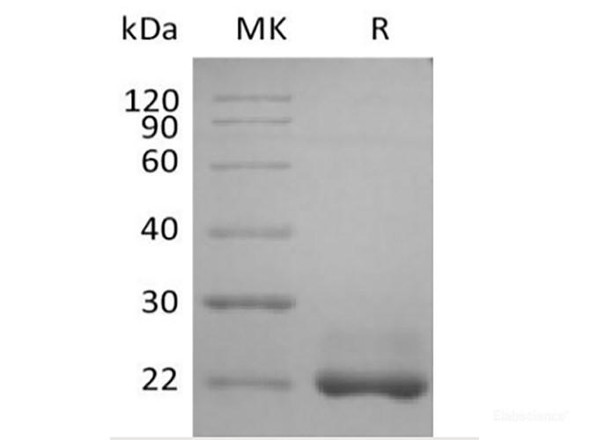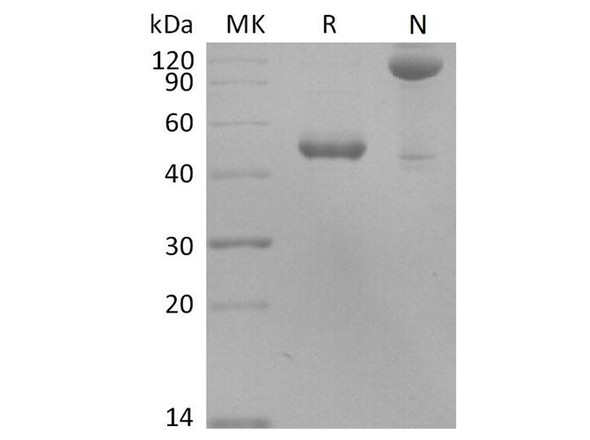Description
Recombinant Human TNFSF13B/BAFF/CD257 Protein
The Recombinant Human TNFSF13B/BAFF/CD257 Protein is a biologically active recombinant protein that plays a significant role in various cellular processes and signaling pathways in human biology. This protein is widely employed in immunological research, cell biology studies, protein-protein interaction analyses, and therapeutic development, providing researchers with a reliable tool for investigating TNFSF13B/BAFF/CD257 function and its implications in health and disease.
This product (SKU: RPCB1340) is produced using advanced expression systems and features a N-6His tag for convenient detection and purification. The protein exhibits a calculated molecular weight of 17.88 kDa with an observed molecular weight of 19-20 kDa under denaturing conditions, achieving ≥ 90 % as determined by SDS-PAGE.. Functional bioactivity has been validated through rigorous quality control assays, confirming its suitability for demanding research applications.
Key Features
| High Purity by Affinity Chromatography | |
| Mammalian & Bacterial Expression Systems | |
| High lot-to-lot consistency via strict QC |
| Product Name: | Recombinant Human TNFSF13B/BAFF/CD257 Protein |
| SKU: | RPCB1340 |
| Size: | 10 μg , 20 μg , 50 μg , 100 μg |
| Reactivity: | human |
| Synonyms: | DTL, BAFF, BLYS, CD257, TALL1, THANK, ZTNF4, TALL-1, TNLG7A, TNFSF20, TNFSF13B |
| Tag: | N-6His |
| Calculated MW: | 17.88 kDa |
| Observed MW: | 19-20 kDa |
| Gene ID: | 10673 |
| Protein Description: | High quality, high purity and low endotoxin recombinant Recombinant Human TNFSF13B/BAFF/CD257 Protein (RPCB1340), tested reactivity in HEK293 cells and has been validated in SDS-PAGE.100% guaranteed. |
| Endotoxin: | < 0.1 EU/μg of the protein by LAL method. |
| Purity: | ≥ 90 % as determined by SDS-PAGE. |
| Formulation: | Lyophilized from a 0.22 μm filtered solution of PBS, pH 7.4. |
| Bio-Activity: | Measured by its binding ability in a functional ELISA.Immobilized Human TNFSF13B (RPCB1340) at 5 μg/mL (100 μL/well) can bind Human TNFRSF17 (RPCB0376) with a linear range of 0.001-2.3 ng/mL. |
| Reconstitution: | Centrifuge the vial before opening. Reconstitute to a concentration of 0.1-0.5 mg/mL in sterile distilled water. Avoid vortex or vigorously pipetting the protein. For long term storage, it is recommended to add a carrier protein or stablizer (e.g. 0.1% BSA, 5% HSA, 10% FBS or 5% Trehalose), and aliquot the reconstituted protein solution to minimize free-thaw cycles. |
| Storage: | Store at -20℃.Store the lyophilized protein at -20℃ to -80 ℃ up to 1 year from the date of receipt. After reconstitution, the protein solution is stable at -20℃ for 3 months, at 2-8℃ for up to 1 week. |
B lymphocyte stimulator (BLyS), also known as TNFSF13B, CD257 and BAFF, is a single-pass type II membrane protein, which belongs to the tumor necrosis factor family. BAFF is abundantly expressed in peripheral blood Leukocytes and is specifically expressed in monocytes and macrophages. BAFF is a cytokine and serves as a ligand for receptors TNFRSF13B (TACI), TNFRSF17 (BCMA), and TNFRSF13C (BAFFR). These receptors are a prominent factor in B cell differentiation, homeostasis, and selection. BLyS levels affect survival signals and selective apoptosis of autoantibody-producing B cells. Thus, it acts as a potent B cell activator and has been shown to play an important role in the proliferation and differentiation of B cells. Overexpression of BLyS in mice can lead to clinical and serological features of systemic lupus erythematosus (SLE) and Sj?gren's syndrome (SS). BLyS is an attractive therapeutic target in human rheumatic diseases. The ability of BLyS to regulate both the size and repertoire of the peripheral B cell compartment raises the possibility that BLyS and antagonists thereof may form the basis of a therapeutic trichotomy. As an agonist, BLyS protein may enhance humoral immunity in congenital or acquired immunodeficiencies such as those resulting from viral infection or cancer therapy.








